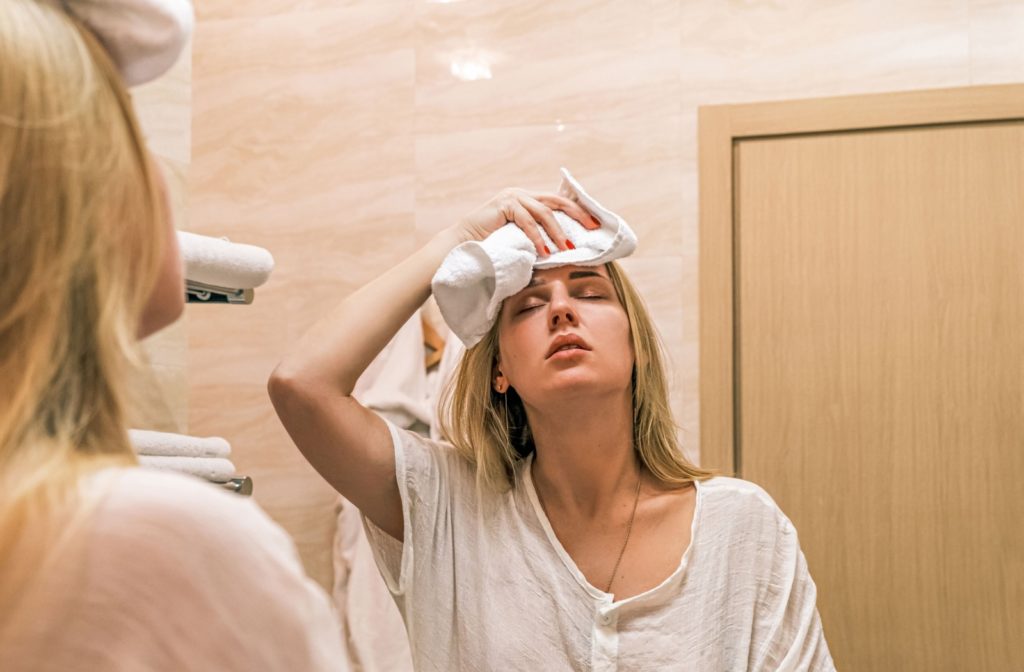Dry eyes are a common condition affecting many people and can result from various causes. They can also cause symptoms like blurry vision and strained eyes. While dry eyes don’t directly cause headaches, the evidence suggests a strong correlation between frequent headaches and chronic dry eye syndrome.
Many people suffer from both conditions simultaneously and may not realize that there could be a connection. Fortunately, dry eyes and headaches typically have simple symptom relief treatments. But it’s essential to consult your eye doctor if you’re experiencing persistent symptoms. They can examine your eyes to rule out underlying conditions and offer tailored advice because there isn’t a one-size-fits-all answer to treating dry eye.
Understanding Dry Eyes
Dry eye syndrome, often known as dry eye, occurs when the eyes don’t produce enough tears or when the tears evaporate too quickly. Tears are crucial for maintaining the health of the eye’s front surface and providing clear vision. Without adequate tear production, the eyes can become irritated and inflamed.
Causes & Risk Factors
Various factors can cause dry eyes, including age, medical conditions like diabetes, certain medications, and environmental factors such as wind or dry climates. Lifestyle choices like prolonged screen time and contact lens usage can also contribute. Certain autoimmune diseases and vitamin A deficiency can also increase the likelihood of developing dry eyes.
Symptoms
Symptoms often include a gritty sensation, burning, redness, and a feeling of something in your eye. While these symptoms are uncomfortable, some experience double the discomfort with simultaneous headaches and dry eyes.
The Link Between Dry Eyes & Headaches
Recent studies have shown that there is indeed a correlation between dry eyes and headaches. Research has found that individuals with chronic dry eyes are more likely to suffer from frequent headaches.
You might squint or strain to see clearly when your eyes are dry. This extra effort can cause the muscles in your eyes and forehead to become tense and tired, leading to headaches. Additionally, the discomfort from dry eyes can affect your overall well-being, indirectly contributing to headache onset.
When to Seek Help
If you experience dry eyes and headaches, it’s essential to recognize their related signs. Common symptoms of dry eyes include a stinging or burning sensation, sensitivity to light, and blurred vision. Headaches related to dry eyes often feel like tension headaches, characterized by pressure around the forehead and temples.
If your headaches are persistent and you also experience dry eyes, it may be time to consult a healthcare professional. They can help determine whether your symptoms are related and recommend appropriate treatments.
Keep a symptom diary to track when you experience dry eyes and headaches. Note any patterns or triggers that might link the 2 conditions. This information can be valuable when discussing your symptoms with a healthcare provider.
Dry Eye Remedies & Treatments
Dry eye remedies and treatments are as varied as the potential causes for the condition. Below are some common options to consider.
Over-the-Counter (OTC) Solutions
There are several OTC options for managing dry eyes. Artificial tears can provide temporary relief by moisturizing the eyes. Antihistamine eye drops may help if allergies cause your dry eyes. For a preservative-free option, consider using Optase, which is available for purchase in our office, to help reduce irritation without added chemicals. OTC pain relievers like ibuprofen or acetaminophen can be effective headache symptom relievers.
Prescription & In-Office Treatments
If OTC solutions aren’t enough, your doctor might prescribe medications such as cyclosporine or lifitegrast to increase tear production. Other in-office treatments, such as IPL therapy or punctal plugs, are also often beneficial.

Home Remedies
Simple home remedies can also offer relief. Warm compresses can help stimulate tear production, while humidifiers can add moisture to the air. For headaches, try placing a cold compress on your forehead or practicing relaxation techniques like deep breathing or yoga.
Prevention Tips
Ideally, a person prevents their dry eyes or headaches in the first place. Here are a few tips that could make a difference.
Lifestyle Changes
Making lifestyle changes can significantly reduce the frequency and severity of dry eyes and headaches. Reduce screen time, take regular breaks, and follow the 20-20-20 rule (every 20 minutes, look at something 20 feet away for 20 seconds).
Hydration & Diet
Staying hydrated is crucial for eye health. Drink plenty of water throughout the day. Incorporate omega-3 fatty acids into your diet to help improve tear quality. Foods rich in antioxidants and vitamins, like leafy greens and fish, can also benefit your eyes.
Environmental Adjustments
Adjust your environment to minimize triggers. Use a humidifier to keep the air moist, especially during winter. Avoid direct exposure to air conditioning and fans. Wearing sunglasses can protect your eyes from wind and UV rays.
Discuss Your Symptoms with Your Eye Doctor
Dry eyes and headaches can be more than nuisances—they can significantly impact your quality of life. Understanding the connection between these conditions is the first step toward effective management. Recognizing the signs, seeking appropriate treatments, and making lifestyle adjustments can alleviate symptoms and improve overall well-being.
Call our team to book an appointment at 2020 Eyecare Ohio if you suspect your dry eyes contribute to your headaches. One of our expert optometrists can discuss your symptoms, examine your eyes, and offer tailored treatment and advice to bring lasting relief.



